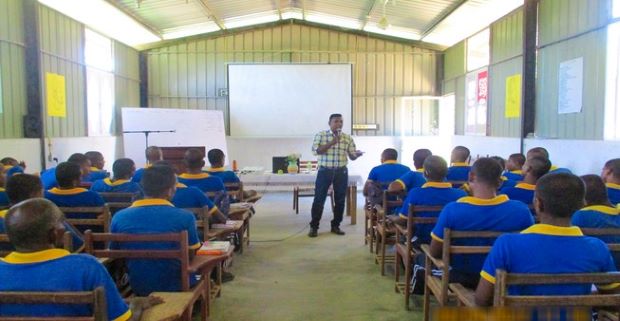COLOMBO – Sri Lanka is discussing the possibility of utilizing prisoners and detainees in drug rehabilitation centres for agriculture, as the country faces a possible food shortage thanks to an overnight ban on chemical fertilizer.
The agri work program aims to convert prisoners into a valuable human resource for the country, a Cabinet statement released on Tuesday (5) said, with no elaboration on whether they will be compensated for their labour.
Under the program, inmates in open and work camps will be instructed by the Department of Agriculture to cultivate high-yielding crops with the aim of fulfilling food requirements of the prisons.
Existing agricultural programs in the three drug rehabilitation centres in the country will be expanded, the statement said.
A thousand acres of unutilized land belonging to the Mahaweli Authority and the National Livestock Development Board in the Kandakadu and Navasenapura regions of Polonnaruwa will be cultivated by the detainees at the rehabilitation centres.
Five hundred acres will be set aside for maize cultivation, and the remaining land for native grains, fruits and vegetables.
The discussions come at a time when the Kandakadu Rehabilitation Centre is under scrutiny by the Human Rights Commission of Sri Lanka, after the suspicious death of a detainee and mass escape of nearly 700 more. Addicts treated at these centres are not considered prisoners, according to officials, though critics claim otherwise.
Sri Lanka is currently going through what experts dub “the worst performing season in a decade,” thanks to the aftereffects of President Gotabaya Rajapaksha’s overnight chemical fertilizer ban.
The ongoing fuel crisis is also causing transport issues, with many retailers complaining that suppliers do not have the fuel to deliver goods.
Sri Lanka’s food prices have gone up 80.1% in the 12 months from June 2021 to June 2022. Many Sri Lankans are finding it impossible to afford basics, even if they are available in the market, and the country’s malnutrition rates have gone up.
A statement by the World Food Program revealed that over than 80% of Sri Lankan families are eating less and cheaper. The country also has the second highest rates of child malnutrition is South Asia according to the UNICEF.
In the face of the crisis, the Sri Lankan government was forced to remove the ban on chemical fertilizer, and has been allocating land for agricultural purposes with the hope of driving up output.
-economynext.com


